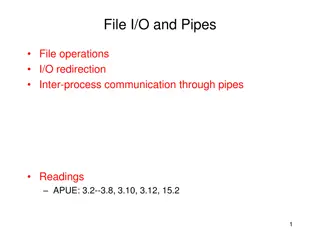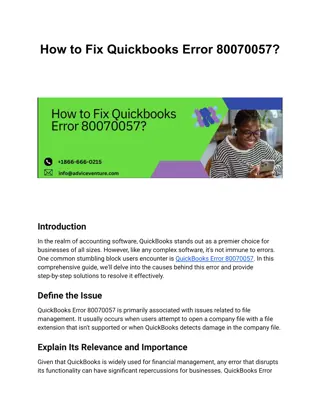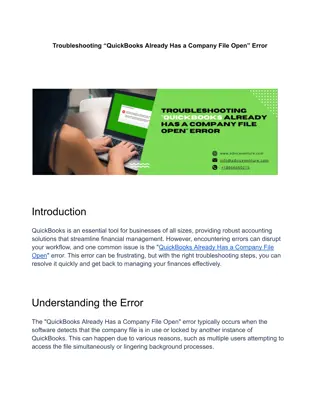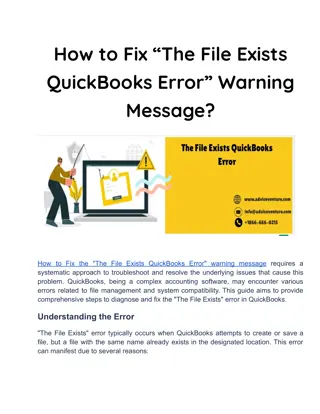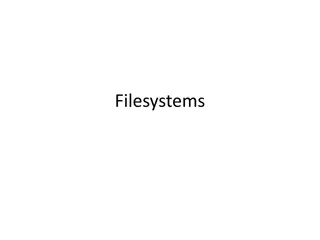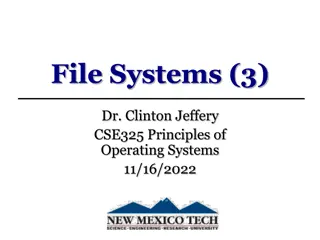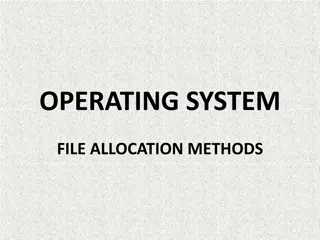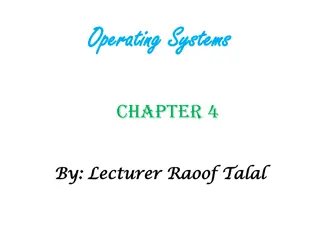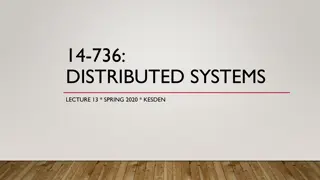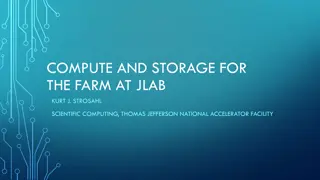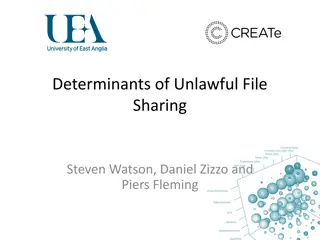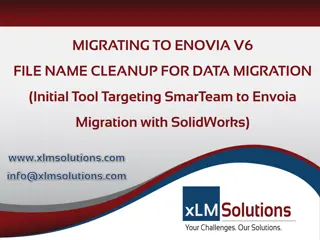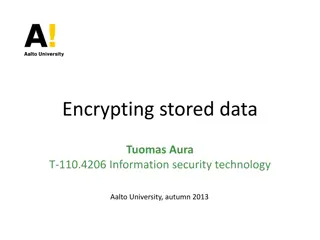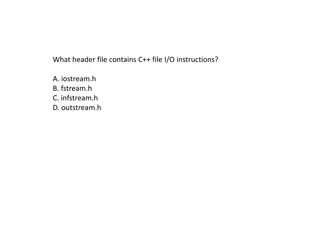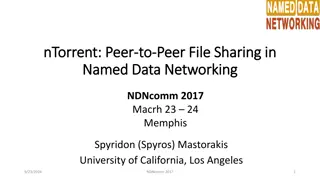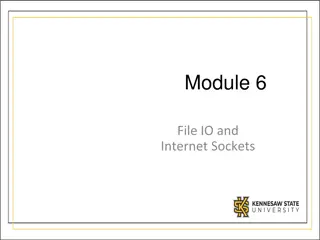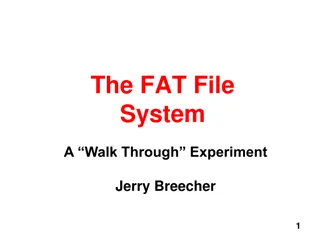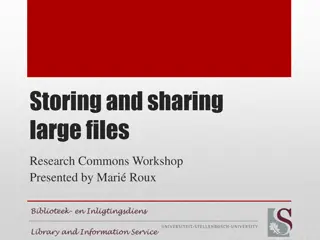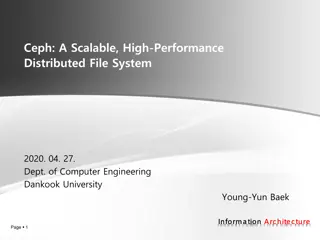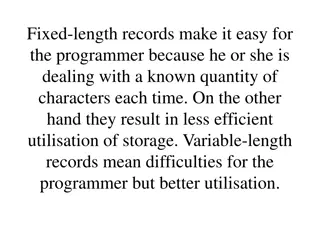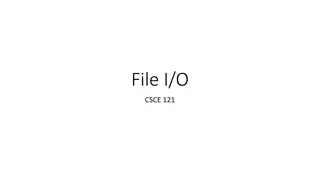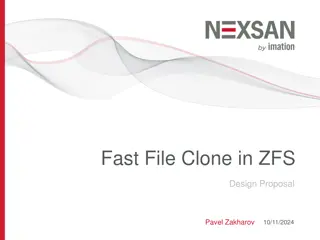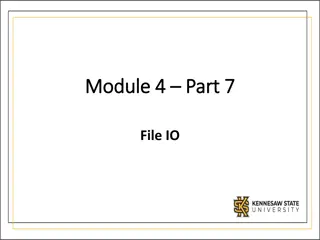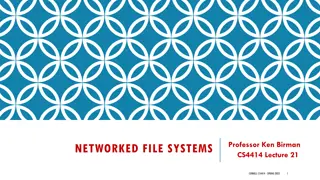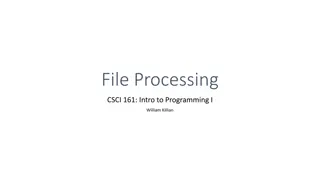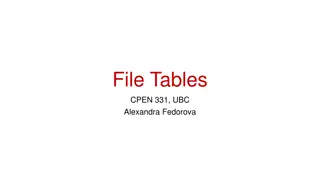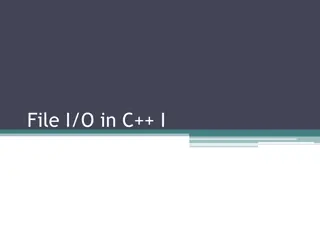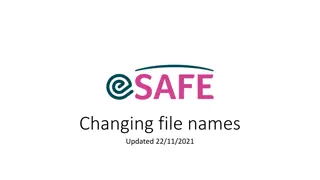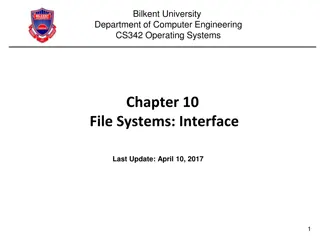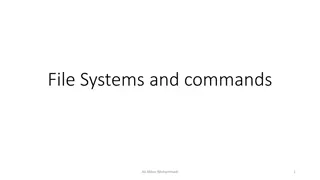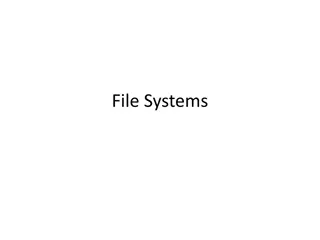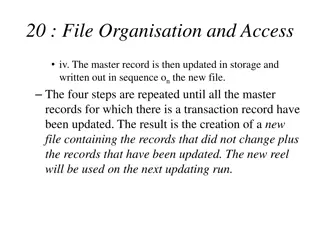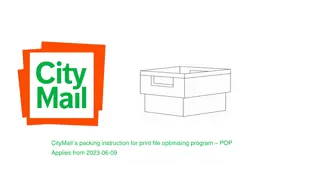File I/O and Inter-Process Communication Through Pipes
Delve into the intricacies of file operations, I/O redirection, and inter-process communication through pipes as discussed in the readings of "Advanced Programming in the Unix Environment" (APUE). Explore data structures for open files, file descriptor tables, implications of data structures, system
4 views • 18 slides
Faculty File Construction Workshop Year 2 Updates 2023
Explore the updates for the Faculty File Construction Workshop Year 2, including important resources, faculty plan requirements, and the purpose of decision file procedure. Learn about the required second-year file content and self-evaluation executive summary for faculty evaluation procedures at St
1 views • 18 slides
How to Fix Quickbooks Error 80070057?
How to Fix Quickbooks Error 80070057?\nQuickBooks Error 80070057 can disrupt financial management. It occurs due to file extension issues or data damage. Symptoms include inability to open files and error code display. Causes involve incorrect file extensions or firewall settings. Diagnostic tools l
1 views • 5 slides
Troubleshooting “QuickBooks Already Has a Company File Open” Error
Troubleshooting \u201cQuickBooks Already Has a Company File Open\u201d Error\nEncountering the \"QuickBooks Already Has a Company File Open\" error? This common issue disrupts your workflow but can be fixed. Start by checking for multiple instances of QuickBooks and restarting your computer. Ensure
1 views • 6 slides
How to Fix “The File Exists QuickBooks Error” Warning Message
How to Fix the \"The File Exists QuickBooks Error\" warning message requires a systematic approach to troubleshoot and resolve the underlying issues that cause this problem. QuickBooks, being a complex accounting software, may encounter various errors related to file management and system compatibil
0 views • 5 slides
Filesystems: A Comprehensive Overview
File systems provide a structured approach to storing and organizing data on secondary storage devices. They involve logical organization of files, directories for grouping related files, sharing data between users, and managing permissions. Files contain data with attributes like size, ownership, a
4 views • 29 slides
File Allocation Strategies in Operating Systems
Explore various file allocation schemes like extent-based systems, linked allocation, file allocation table (FAT), indexed allocation, and combined schemes used in operating systems. Learn about their pros and cons, including details on maximum file size calculations based on disk block sizes and po
0 views • 20 slides
Operating System: File Allocation Methods
File allocation methods in operating systems determine how files are stored in disk blocks. The main methods include Contiguous Allocation, Linked Allocation, and Indexed Allocation. Contiguous Allocation involves allocating blocks in a contiguous manner for efficient disk space utilization and fast
1 views • 14 slides
Implementation of File System in Operating Systems
Various structures, such as boot control blocks and directory implementations, play a crucial role in implementing a file system in operating systems. These structures help in managing disk and in-memory data efficiently, ensuring effective file storage and retrieval. Linear lists and hash tables ar
1 views • 22 slides
Distributed File Systems
A distributed file system manages files across multiple machines on a network, providing users with a seamless experience as if they were using a local file system. This system abstracts details such as file locations, replicas, and system failures from the user, ensuring efficient and reliable file
0 views • 35 slides
Safety Director 101: The Driver Qualification File
The Driver Qualification (DQ) File is a critical element in safety programs, ensuring compliance with Part 391 Qualification of Drivers in the Federal Motor Carrier Safety Regulations. DQ files must be kept up-to-date with quarterly reviews, spot checks, new hire reviews, and policy updates. Buildin
1 views • 25 slides
Analysis of file:// Vulnerabilities in Android Browser Apps
The study delves into file:// vulnerabilities in Android browser apps, uncovering risks posed by the file:// URI scheme. It highlights how file:// requests can breach app data isolation, potentially compromising sensitive files. The research presents a unified attack model, FileCross automated testi
0 views • 22 slides
Compute and Storage Overview at JLab Facility
Compute nodes at JLab facility run CentOS Linux for data processing and simulations with access to various software libraries. File systems provide spaces like /group for group software, /home for user directories, and Cache for write-through caching. Additionally, there are 450TB of cache space on
0 views • 11 slides
Determinants of Unlawful File Sharing: Insights and Implications
This comprehensive review delves into the determinants of unlawful file sharing behavior, exploring factors such as proximity to actual behavior, financial and legal considerations, and the impact on sales. It discusses the reasons behind illegal file sharing, including the influence of laws, pricin
0 views • 15 slides
ENOVIA V6 File Name Cleanup for Data Migration
Problematic file names with unsupported characters can hinder data migration into ENOVIA V6, impacting object busname, titles, and filenames. This article proposes a solution involving filename changes, database updates, and file vault maintenance. The methodology includes SQL queries for analysis,
0 views • 5 slides
Data Encryption and File Security
Exploring data encryption and file security, covering topics such as scenarios for encryption, file encryption methods, limitations, and secure file deletion techniques. Highlighting the challenges of balancing security, usability, and reliability in computer systems.
0 views • 29 slides
C++ File I/O Operations
Learn about C++ file I/O operations, including input/output instructions, file handling with ifstream and ofstream, opening multiple files, checking end of file, and a review of the file I/O process. Discover how to write to an ASCII file and read data from it in C++ programming. Practice with examp
0 views • 47 slides
Evolution of Peer-to-Peer File Sharing Technologies
Explore the evolution of peer-to-peer file sharing technologies through a detailed overview of nTorrent, Data-centricity, TCP/IP hurdles, and common design elements between BitTorrent and NDN. Delve into the challenges, solutions, and innovative approaches in securely retrieving torrents with hierar
0 views • 11 slides
File Input/Output in Java
Learn about file input/output operations in Java. Explore how to read and write data to files, handle exceptions using try/catch, work with streams, understand the process of file handling, and examine file structure examples like storing airline data. Enhance your Java programming skills by masteri
0 views • 41 slides
The FAT File System: A Comprehensive Overview
Explore the significance of the FAT file system, its history, versions, limitations, and practical applications. Learn about booting mechanisms, sector allocation, file definitions, and the challenges associated with file deletion and defragmentation. Discover the structure of a FAT disk, including
0 views • 22 slides
PHP File Handling Functions Overview
The PHP file handling functions discussed in the content include mkdir, rmdir, unlink, reading contents from remote files, file_get_contents, rename, strtotime, and gmdate. Each function serves a specific purpose in file manipulation, such as creating directories, removing files, reading contents fr
0 views • 11 slides
Guide for File Download Block Creation
In this guide, you will learn how to create a file download block on your webpage step by step. First, you need to click the small plus symbol, then initiate the file download process. You can customize the title, format, text color, and background theme accordingly. Finally, you can choose when and
0 views • 34 slides
New Features and Enhancements in GTAS 2.5 Bulk File Upload Process
Explore the revamped Bulk File Upload process in GTAS 2.5, including improved navigation, new menu options, and a comprehensive ATB Bulk File Processing Status dashboard for tracking file uploads and processing statuses efficiently.
0 views • 27 slides
Efficient Ways to Store and Share Large Files
Explore the world of file hosting services for storing and sharing large files, focusing on Google Drive, Dropbox, and SkyDrive. Discover their similarities, security features, and sharing capabilities. Learn about SSL support, file encryption, and the ability to share files with ease. Dive into the
0 views • 19 slides
Overview of Ceph: A Scalable Distributed File System
Ceph is a high-performance distributed file system known for its excellent performance, reliability, and scalability. It decouples metadata and data operations, leverages OSD intelligence for complexity distribution, and utilizes adaptive metadata cluster architecture. Ceph ensures the separation of
0 views • 23 slides
File Characteristics and Efficient Storage Methods
Fixed-length records simplify programming by dealing with a known quantity of characters each time but result in less storage efficiency. Variable-length records offer better storage utilization despite posing challenges for programmers. Apart from hit rate and activity, file characteristics like vo
0 views • 11 slides
Efficient File I/O Handling in C++
Effective management of file input and output operations in C++ is crucial for smooth program execution. The Resource Acquisition Is Initialization (RAII) technique offers a preferred approach for interacting with file streams, ensuring proper resource handling during an object's initialization and
0 views • 6 slides
Efficient File Handling Techniques in Python
Explore efficient file handling techniques in Python, such as using 'with' keyword to automatically close files, iterating over lines in a file, splitting lines into fields, and performing operations on CSV files. Learn how to work with a CSV file containing Starbucks data to find the maximum and mi
0 views • 24 slides
Fast File Clone in ZFS Design Proposal Overview
This document details a proposal for implementing fast file clone functionality in ZFS, allowing for nearly instant file copying through referencing. The motivation behind this proposal includes support for VMware VAAI, NAS Full File Clone, and Fast File Clone to save memory and disk space. The prop
0 views • 29 slides
File Input/Output in Python Programming
Exploring the basics of File I/O (Input/Output) in Python, including reading from and writing to text files. Learn how to read all content from a file as a string or a list, and how to write data to a file using Python's file handling capabilities.
0 views • 12 slides
Evolution of Networked File Systems in Computer Science
The evolution of networked file systems in the computer science field has been pivotal in enabling remote file storage, distributed coordination, and improved system stability. Starting from Bill Joy's innovations in the BSD version of Unix to the introduction of NFS by Sun Microsystems, the concept
0 views • 55 slides
File Processing and Input/Output Operations in Java
Gain insights into file processing and I/O operations in Java programming, covering topics such as file handling, reading files, file paths, compiler errors, exceptions, and the 'throws' clause. Learn how to work with files, handle errors effectively, and optimize your code for efficient file manage
0 views • 41 slides
File System Calls and Operations in Operating Systems
Explore the concepts of file system calls, opening files, reading from files, setting file offsets, closing files, and maintaining file states in an operating system. Learn how to interact with files efficiently while understanding the underlying mechanisms and necessary actions for file handling.
0 views • 21 slides
File Input/Output (I/O) in C++
File Input/Output (I/O) is an essential concept in C++ programming, allowing for interaction with files stored on secondary storage devices. This involves steps like including the fstream header file, declaring file stream variables, associating them with input/output sources, opening the file, perf
0 views • 19 slides
Guide to Changing File Names and Updating Them Easily
Learn how to efficiently change file names and update them in your system. Discover methods for modifying file names that are already uploaded, renaming files during upload, and managing file details effortlessly. Follow step-by-step instructions with helpful images for a seamless experience.
0 views • 4 slides
File Systems in Operating Systems
File systems are essential components of operating systems that manage the organization, storage, and retrieval of files. This content explores the function of file systems, their interfaces, design tradeoffs, file concepts, attributes, and structures. It covers topics such as access methods, direct
0 views • 49 slides
File Systems: File Naming, Extensions, and Structure
File systems and commands play a crucial role in managing information on disks while shielding users from the complexities of storage mechanisms. This article delves into the rules of file naming, distinctions between upper and lower case letters, file extensions indicating file types, and the under
0 views • 85 slides
File System Design Challenges and Options
Exploring the complexities of file system design, this content delves into various aspects such as file layout, design constraints, data structures, design challenges, options like FAT, FFS, NTFS, and more. It discusses the challenges of locating file blocks, index granularity, free space management
0 views • 33 slides
Sequential File Maintenance and Organisation Process
In sequential file maintenance, the master records are updated and written to a new file in sequence after processing transaction records. This process continues until all relevant master records are updated, resulting in a new file with unchanged and updated records. Additional steps involve file s
0 views • 7 slides
Optimizing Print File Packing Instructions for CityMail Program
In the CityMail program effective from June 9, 2023, the print file optimizing process involves several steps such as file processing, sorting, production file enhancements, and bundling for efficient handling. Various codes and keys are used to streamline the process, ensuring the accurate bundling
0 views • 9 slides
